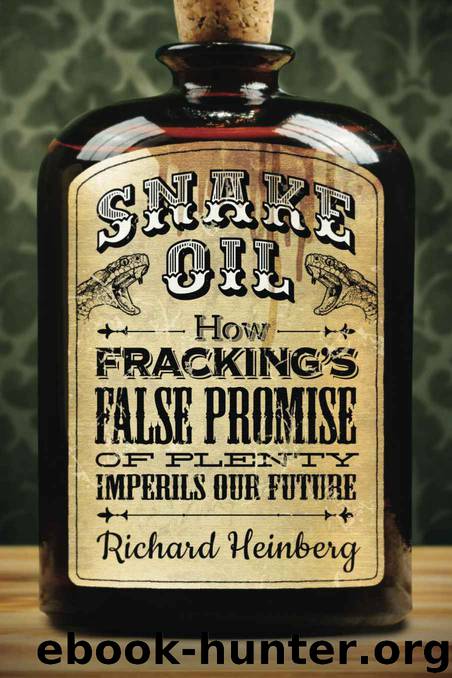Snake Oil: How Fracking's False Promise of Plenty Imperils Our Future by Heinberg Richard

Author:Heinberg, Richard [Heinberg, Richard]
Language: eng
Format: epub, mobi
Publisher: Post Carbon Institute
Published: 2013-07-24T00:00:00+00:00
The Bottom Line on Fracking’s Potential to Revolutionize Oil and Gas Production
Raymond Pierrehumbert, Professor of Geophysical Sciences at the University of Chicago, recently summarized the situation with crystalline brevity: “Oil production technology is giving us ever more expensive oil with ever-diminishing returns for the ever-increasing effort that needs to be invested.”23 The numbers tell the story: in the decade between 1994 and 2004, roughly $2.4 trillion in oil industry capital expenditures buoyed the worldwide rate of oil production by 12 million barrels per day. Yet a similar $2.4 trillion in capital expenditures spent from 2005 to 2010 failed to stem the tide of declining production in the world’s older, supergiant oil fields. Global oil production during those five years declined by two hundred thousand barrels per day.24 The ongoing substitution of conventional, cheap oil with expensive, technology-intensive, unconventional oil sources can be compared to the human body’s use of internal energy resources in the absence of sufficient food. If one doesn’t eat for a few days, the body starts burning stored fat, then muscle, and finally tissues surrounding internal organs. Each next step in the process reduces overall health but is necessary to maintain life. Similarly, the global economy naturally prefers to burn regular, conventional, cheap petroleum. But as supplies dwindle, markets prioritize the use of functionally similar fuels, even though their extraction requires much higher rates of drilling, is therefore more expensive (thus impacting oil prices and the global economy), and is more environmentally risky.
Fracking gives our current energy system a brief, fragile reprieve. New extraction technology cannot return us to the bygone era of cheap energy and easy economic growth. The best it can do is to buy us a few years of relative economic stability in which to develop alternative energy sources and build low-energy transport and food systems.
But instead of embarking on that needed project, our political leaders have unquestioningly seized on exaggerated claims from oil industry hucksters promising a century of cheap natural gas and soaring oil production rates. The result is an “all of the above” energy policy with no clear direction, and a dangerous complacency about the fate of essential but highly vulnerable food and transport systems designed during past decades of hydrocarbon abundance.
Rather than a century of plenty, we face the likely recommencement of declines in US oil and gas production before 2020. We’ve purchased a few years of respite from the relentless and inevitable erosion of our nation’s oil and gas production rates, but at what cost?
Download
Snake Oil: How Fracking's False Promise of Plenty Imperils Our Future by Heinberg Richard.mobi
This site does not store any files on its server. We only index and link to content provided by other sites. Please contact the content providers to delete copyright contents if any and email us, we'll remove relevant links or contents immediately.
| Alternative & Renewable | Drilling Procedures |
| Electric | Fossil Fuels |
| Mining | Nuclear |
| Power Systems |
Whiskies Galore by Ian Buxton(41986)
Introduction to Aircraft Design (Cambridge Aerospace Series) by John P. Fielding(33115)
Small Unmanned Fixed-wing Aircraft Design by Andrew J. Keane Andras Sobester James P. Scanlan & András Sóbester & James P. Scanlan(32788)
Craft Beer for the Homebrewer by Michael Agnew(18234)
Turbulence by E. J. Noyes(8040)
The Complete Stick Figure Physics Tutorials by Allen Sarah(7362)
The Thirst by Nesbo Jo(6929)
Kaplan MCAT General Chemistry Review by Kaplan(6926)
Bad Blood by John Carreyrou(6610)
Modelling of Convective Heat and Mass Transfer in Rotating Flows by Igor V. Shevchuk(6432)
Learning SQL by Alan Beaulieu(6277)
Weapons of Math Destruction by Cathy O'Neil(6263)
Man-made Catastrophes and Risk Information Concealment by Dmitry Chernov & Didier Sornette(6002)
Digital Minimalism by Cal Newport;(5747)
Life 3.0: Being Human in the Age of Artificial Intelligence by Tegmark Max(5545)
iGen by Jean M. Twenge(5408)
Secrets of Antigravity Propulsion: Tesla, UFOs, and Classified Aerospace Technology by Ph.D. Paul A. Laviolette(5364)
Design of Trajectory Optimization Approach for Space Maneuver Vehicle Skip Entry Problems by Runqi Chai & Al Savvaris & Antonios Tsourdos & Senchun Chai(5063)
Pale Blue Dot by Carl Sagan(4996)
